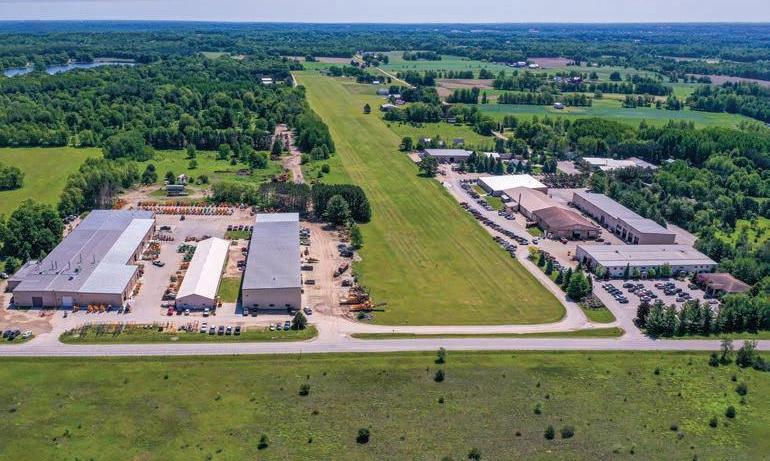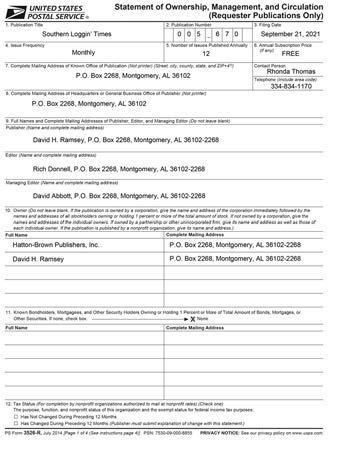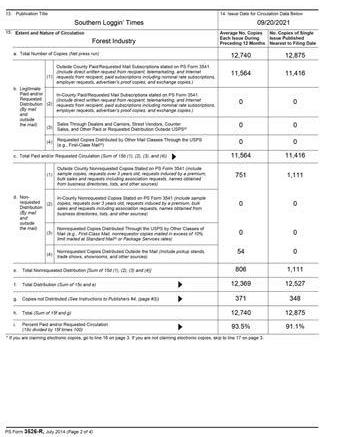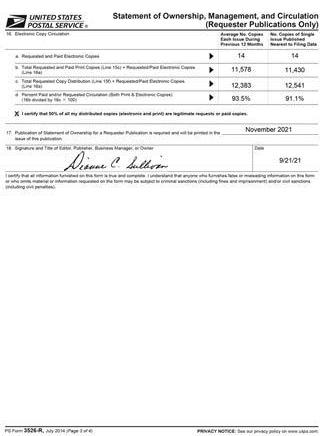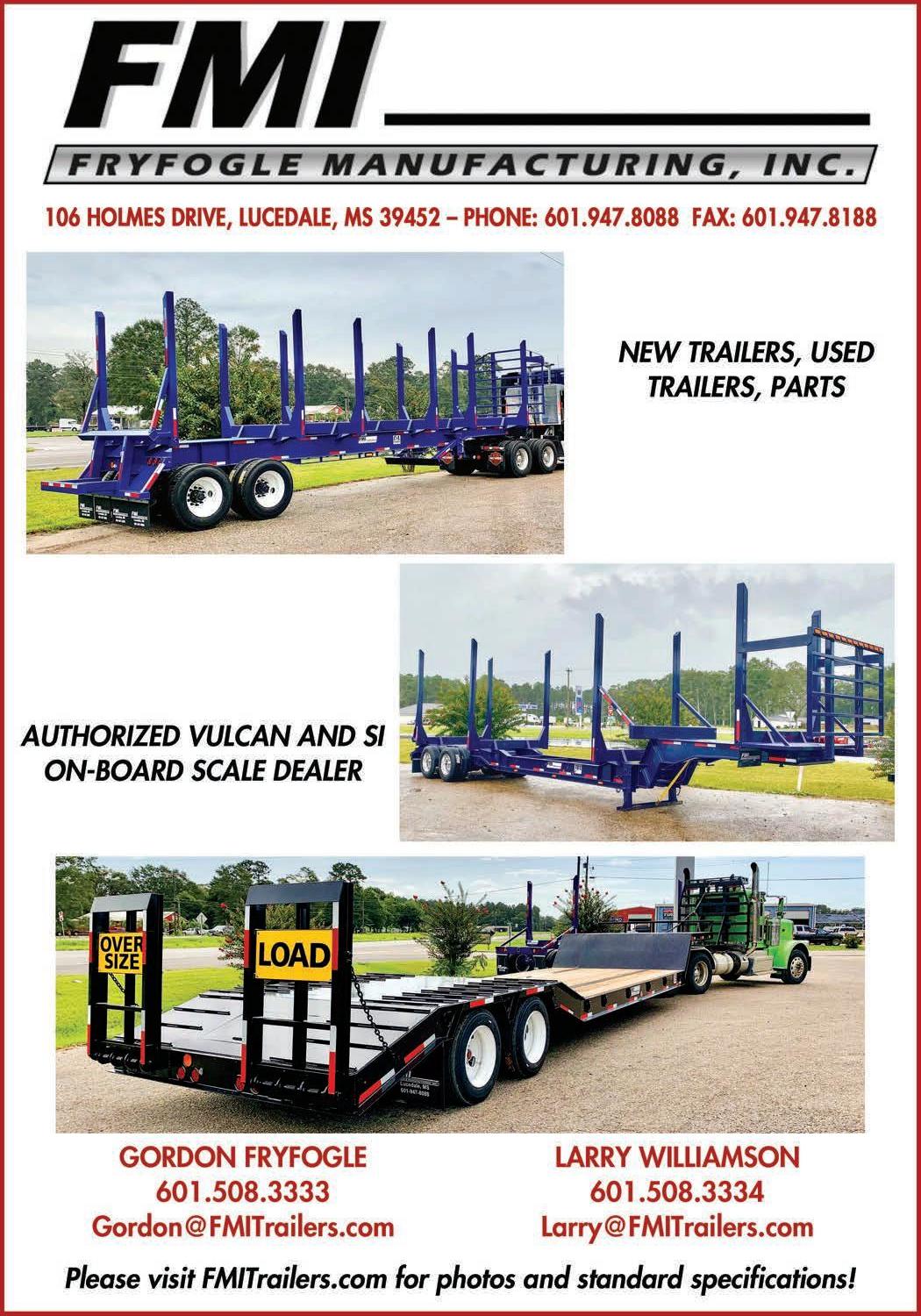
15 minute read
Industry News Roundup
As We See It: As We Are Seen
By Scott Dane
American Loggers Council recently held its 2021 Annual Membership Meeting and Conference in Coeur d’Alene, Idaho. Even with the ongoing uncertainty of the Pandemic, 180 timber industry representatives gathered for three days of business, seminars, logging operation tours and other events. Why did logging industry representatives from all four corners, and in between (28 states) attend? Because these industry leaders know that it is the American Loggers Council that represents them and their issues.
Opening the conference was Idaho Governor Brad Little, who personally attended, formally addressed and welcomed the group, and visited with the attendees. Why, in his busy schedule, did Governor Little attend the conference? Because he recognizes the value of Idaho’s timber industry (not to mention his personal and professional relationship with the Associated Contract LoggersIdaho, their staff and members) and the role that the American Loggers Council plays in collectively representing the 30 state association members.
Participating in the conference was Julie Tucker, a representative of the U.S. Forest Service, DC Headquarters Office. Why did the USFS official attend and participate in the conference? Because the U.S. Forest Service appreciates the collaborative professional relationship between themselves and American
Loggers Council. Additionally, as the PATHH program application deadline approached, they knew that directly reaching the 28 states that were represented at the conference was the most effective way to reach out to loggers and truckers across the country.
While at the conference, the
Amer ican Loggers Council re ceived a direct official correspondence from the White House specifically addressing the American Loggers Council, the conference, and the economic and environmental benefits that the timber industry provides in sustainable forestry. Why did President Biden reach out to the American Loggers
Council during the conference?
Because healthy forests, wildfire mitigation, rural jobs, and carbon sequestration are not partisan issues. They are shared objectives, and the timber industry, represented by American Loggers Council, is recognized as being a key element to accomplishing those objectives.
A couple of weeks ago the House
Committee on Small Business, Subcommittee on Underserved, Agricultural and Rural Business Development held a hearing on “Sustainable Forestry’s Role in Climate
Solutions.” Of the four witnesses testifying, two were American Loggers Council affiliated. Scott Dane,
American Loggers Council Executive Director, testified on behalf of the minority party (Republicans), and Dana Doran, Professional Logging Contractors of Maine (American Loggers Council member) Exe cutive Director, testified on behalf of the Subcommittee Chairman
Jered Golden and the majority party (Democrats). Why was the American Loggers Council invited to provide congressional testimony? Be cause both parties recognize and re spect the fact that American Loggers Council and its members are necessary to healthy forests, created by science based silvicultural practices performed by the timber indus-
Dane
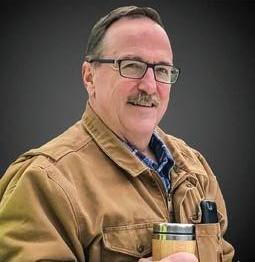


try. American Loggers Council Legislative Committee Chairman Henry Schienebeck (GLTPA Executive Director) testified at a previous congressional hearing this past summer as well.
So, “How are WE, the American Loggers Council, Seen?” We are seen as a leading professional organization that represents the American logging industry, speaking on their behalf, and as the national voice for professional loggers.
To be part of the American Loggers Council, join your state associations, join the American Loggers Council directly as an Individual Logging Member if your state does not have a logging association, or if you are an ancillary company (supplier, consumer, vendor, OEM, or other association) you may join as an Associate Member. Be Seen, Be Heard. For more information on these membership options and to join visit www.amloggers.com.
Scott Dane is Executive Director of the American Loggers Council. ALC is a 501(c)(6) trade association representing the interests of timber harvesting and timber hauling businesses across the United States. For more information visit www.amloggers.com.
Westervelt Expands Timberland Holdings
The Westervelt Company and Caisse de dépôt et placement du Québec (CDPQ), a global investment group, announced the acquisition of more than 76,000 acres of high-quality pine timberland and the creation of a new strategic partnership that will focus on sustainable timberland management.
The newly acquired property had been owned and managed for nearly a century by Superior Pine Products, a family-owned company headquartered in Georgia.
“This was a rare opportunity to purchase a special timberland asset in southeast Georgia. The land matches Westervelt’s strategic growth and diversification objectives, and its age class distribution balances growth and sustainability goals,” comments Westervelt President and CEO Brian Luoma.
“As we move forward with our strategic plan to geographically diversify our timberland holdings, this transaction will enable our company to grow in other market
By Jimmie Locklear
Concerns about forest products transportation continue to grow nationwide. An ever-increasing qualified driver shortage, as well as keeping up with constantly evolving state and federal regulations challenge sustainability for many. The good news is that cooperative efforts in the Midwest are moving forward with assistance for loggers, mills and wood products transportation companies interested in taking positive actions to improve their operations.
Michigan Assn. of Timbermen (MAT), Great Lakes Timber Professionals Assn. (GLTPA) and Forest/ Loggers/Mauck Insurance Agencies have joined to provide assistance for the transportation segment of the forest products industry. TEAM Safe Trucking began six years ago as a nationwide effort to develop truck driver safety programs for log, chip and lumber truck drivers that would focus on their unique transportation environment. The support provided by MAT, GLTPA and F/L/M Insurance Agencies was instrumental to the progress of TST Driver Safety modules development nationwide. Over the past several years, TST Driver Safety Program modules have been accepted as SFI continuing education credits (CE) in Michigan and Wisconsin. Although truck drivers are not required to comply with SFI requirements at this time, this is an excellent opportunity to inform logging and trucking operations about the benefits of truck driver safety programs and compliance.
SFI class attendees have been very receptive to having TST in cluded as part of their CE classes. I have experienced occasions when attendees remained 30-40 minutes past scheduled class time with questions and comments. Many have expressed their appreciation for addressing their trucking concerns and would like to see more TST class subjects made available in other venues as well. We are currently seeking out assistance from various logging, trucking and wood consumer operations in Michigan and Wisconsin for venues to provide truck driver safety programs and education sessions. Please contact MAT, GLTPA or F/L/M Insurance Agencies if you would like to host a meeting. In the summer of 2020, the Great Lakes Forest Products Truck Safety Team (GLFPTST) was created to help promote truck driver safety and compliance, as well as TEAM Safe Trucking Driver Safety Program modules in the Great Lakes region. In the fall of 2020, the Forest Products Transportation Truck Owners Guide for Safety & Compliance booklet was completed and distributed at various meeting venues and individual risk control visits to logging, transportation and wood consumer operations in the Great Lakes region. Compliance with governmental requirements for both the truck and the driver are very important to an insurance provider’s underwriting process in today’s world. When a truck and a driver are involved in a crash, the settlement of that claim will increase greatly if either is found to be non-compliant and/or in violation of the laws that apply. This continues to be a major problem for commercial truck insurers and requires higher premiums to cover claims cost. Finally, having an active truck driver safety program as standard operational procedure for your truck drivers is essential in today’s transportation environment. Your driver’s safety and the public’s safety depends on your concern for them. Contact me for more information and assistance with these programs available for your operation at no cost to you. Jimmie Locklear is with the Great Lakes Forest Products Truck Safety Team and with Risk Control Services, Forest Insurance Center Agency, Inc., 906-291-0011; e-mail: jimmiel@forestinsurancecenter.com

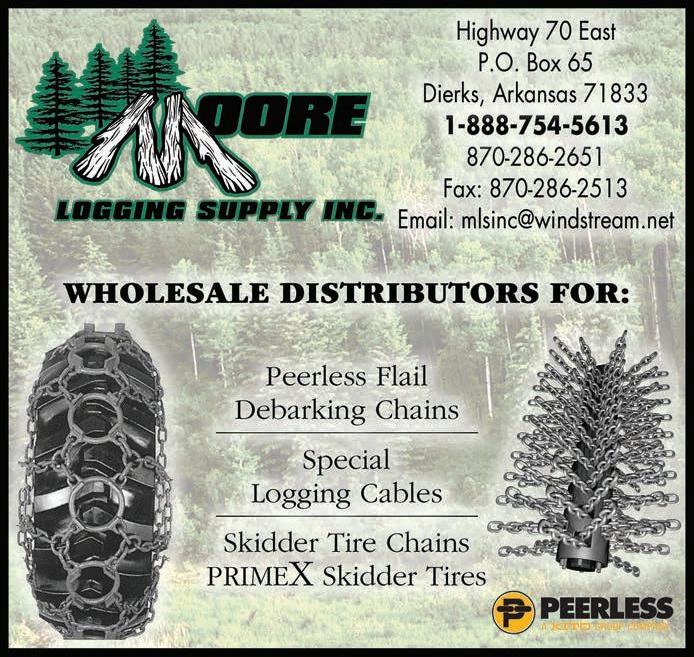


areas while retaining ownership in our core area of operations. Westervelt and CDPQ align with our Company values and commitment to sustainability, so we are excited about this opportunity for all entities and look forward to future possibilities for growth,” says Scott Griffin, President and CEO at Superior Pine Products Co.
Roseburg has completed the purchase of 30,000 acres of timberland in the Southern U.S. from Forest Investment Associates (FIA). The properties are in the northeast region of North Carolina and the southeast region of Virginia, and consist of well-managed loblolly pine plantations. Roseburg already owns 158,000 acres of timberland in the Roanoke Valley, following a 2017 acquisition.
“The addition of these high-quality properties to our existing Roanoke Tree Farm allows us to add more scale and operational efficiency to our Southeastern timber operations,” Roseburg Senior Vice President of Resources Scott Folk says.
The lands acquisition follows the July 1 announcement of Roseburg’s plan to build a new, high-capacity sawmill in nearby Weldon, NC, to be called Roanoke Valley Lumber.
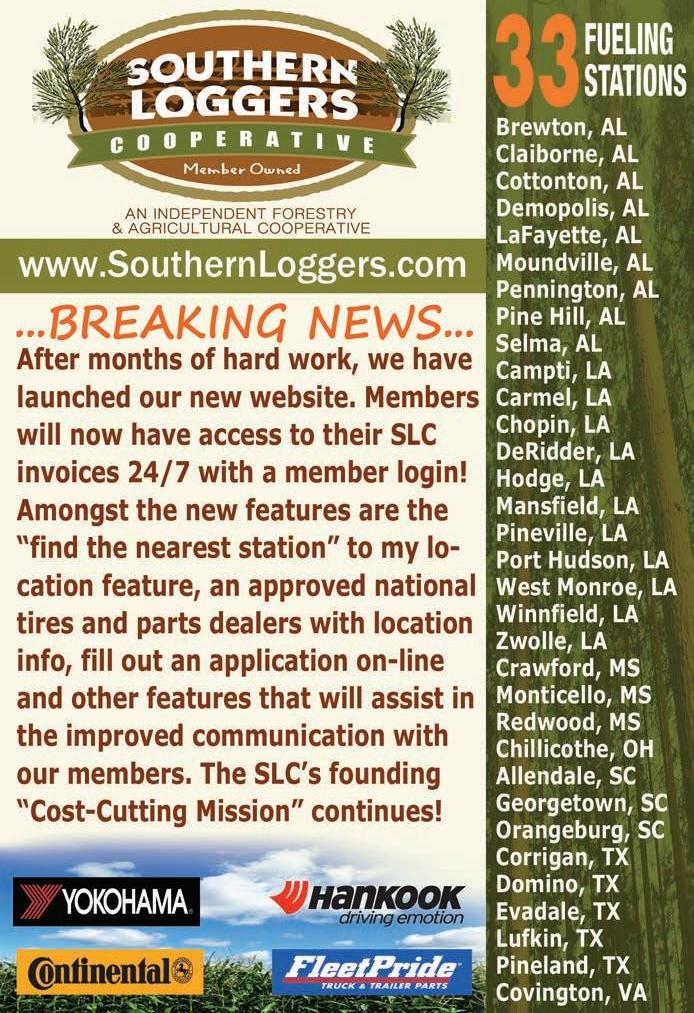

Maverick Environmental Reps For Morbark
Morbark LLC announced that Maverick Environmental Equipment has been selected as a Morbark Industrial Products dealer for Ohio, Indiana, Kentucky and western West Virginia. Morbark is a leading manufacturer of tree care, forestry, sawmill, and wood recycling equipment.
“We’re very familiar with the Morbark product line as well as the management at Morbark, so this partnership was a natural progression,” says Tim Smith, Managing Partner at the Maverick Ohio North
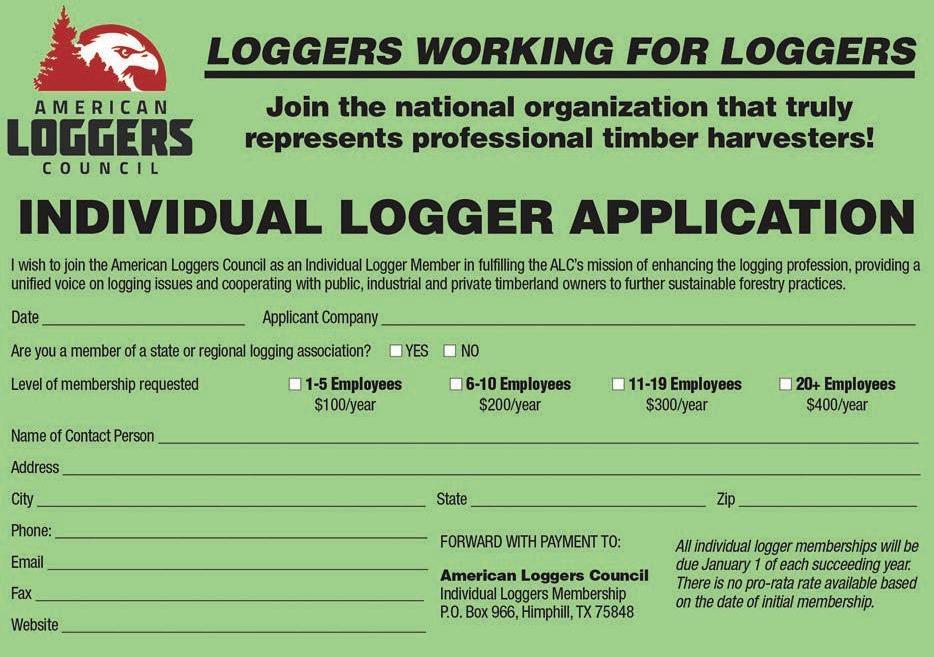
Southern Sawmill Patriarch Varn Passes
George W. Varn, Sr., who broke into the family turpentine business following World War II, and then along with a cousin built a chip mill and a sawmill in the late 1960s in Hoboken, George Varn, Sr. was nearing 101. Ga., called Varn Wood Products, and who became one of the patriarchs of the southern pine lumber industry, died September 4 in St. Vincent’s Hospital in Jackson ville, Fla., the same hospital in which he was born December 1, 1920. He was 100, fast approaching 101.
For 40 years, Varn regularly expanded and upgraded the sawmill, personally engineering and overseeing equipment installation with exquisite detail. Varn was a familiar and most welcomed sight at the SFPA lumber machinery expo, rapidly walking the floor in his trademark seersucker jacket.
Varn graduated from Bolles School in Jacksonville as valedictorian in 1938 and graduated from Harvard University with a degree in agriculture economics and as a member of the Phi Beta Kappa Society in 1942.
During World War II, he served in Naval Intelligence, spending his entire stay deciphering the Japanese War Department code, while stationed in DC, Pearl Harbor and Guam. Varn once commented, “I was a small part of a spectacularly successful Navy operation.”
While being mustered out of the
Navy in Charleston, SC, Varn fell for Betty Van Dyke, a Naval Waves
Ensign and journalist. They were married in 1946 and remained so for 65 years until her death in 2011.
Varn’s grandfather, George, and great uncle, K.S. from the Baxley/
Hazlehurst area, had long worked in the turpentine business and in the 1940s built a central processing plant in Hoboken. After his military service, George joined the family business in turpentine brokerage, before teaming with a cousin, Jacob Varn, to form Pine
Gum Production Corp. When the
Naval Stores industry declined in the mid 1960s, George and Jacob became pulpwood dealers as Varn
Timber Co. and established a large pulpwood wood yard in Waycross.
They then worked a deal with
Container Corp. to build a chip mill at Hoboken and supply chips to the Container mill in Fernandi-

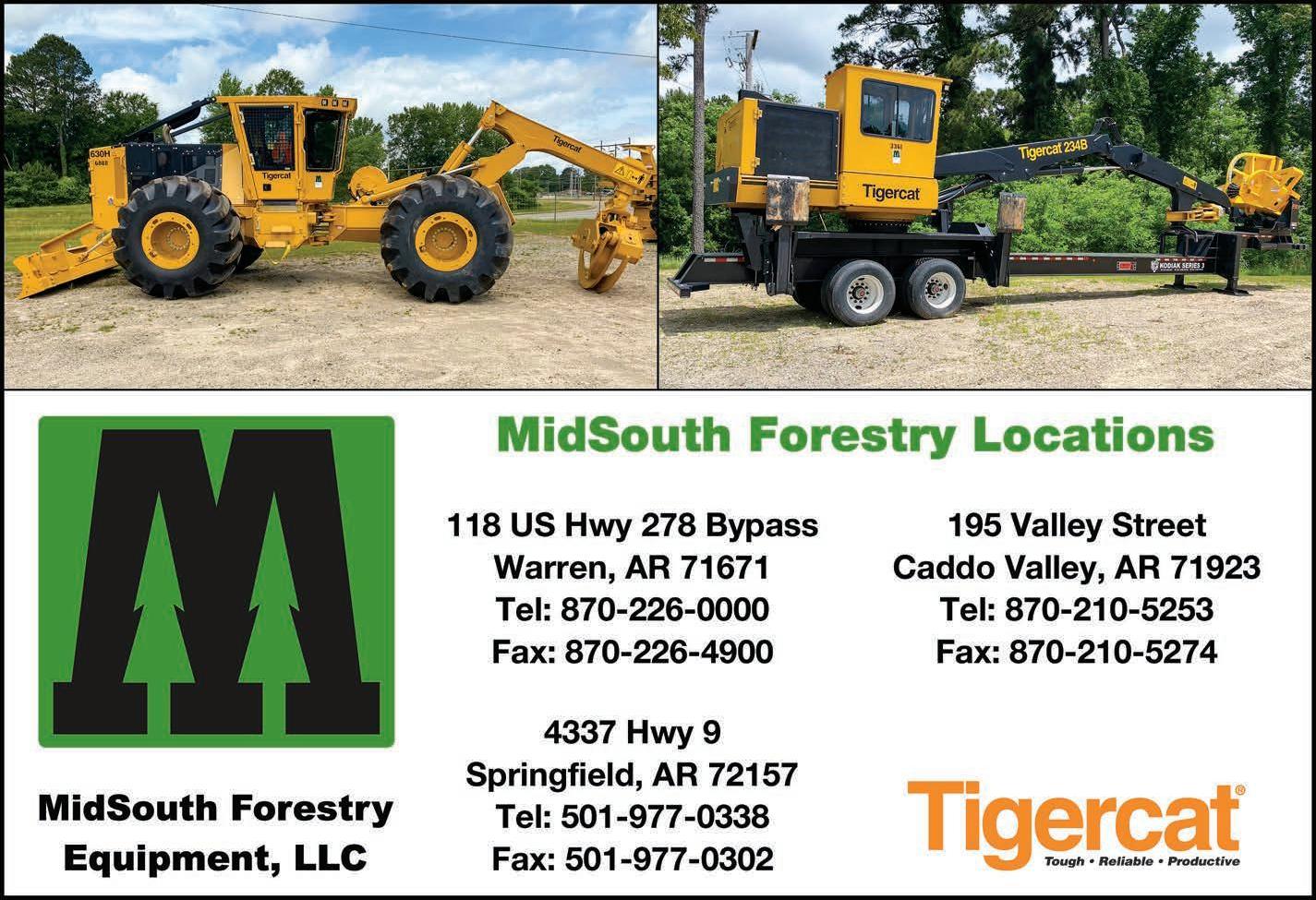
na Beach. The chip mill started up in 1968 and then the Varns started up a sawmill to process the graded out sawlogs. “We didn’t know anything about sawmills,” Varn recalled.
The sawmill remained a consistent chips and lumber producer with the emphasis on chips. “From the beginning we fashioned a mill that would work with paper mills,” Varn said.
Varn said his family members, especially his great uncle, K.S., were conservationists before the word was even used, owning timberland in the Folkston and Valdosta areas, some of it dating back 185 years. “We take considerable pride in that,” Varn once said. “You can’t own land that long without taking care of it.”
Once asked about his longevity, Varn replied, “I can’t tell you. If I knew what it was, I believe I could sell it. I just have approached each day and they have added up. I just kept going.”
Barko Hydraulics has partnered with Minnesota-based Stearns Bank National Assn. to provide exclusive retail financing to dealerships across the United States.
“We are very excited to be partnering with such an incredible organization as Stearns Bank. Both Barko and Stearns Bank want to provide not only competitive financing to the retail market but also an incredibly personal level of service and customer experience,” says Barko President Justin Rupar. “Our combined goal is to make the financing experience easy and enjoyable so that our dealer partners can grow their business and capture a larger percentage of potential sales.”
The partnership preserves both organizations’ personal, relationship-building models to create a fast, efficient and connected financing experience for Barko dealers to offer their customers. As demand for forestry and heavy equipment solutions continues a steady growth pattern, Stearns
Bank is poised to help Barko dealers meet demand head-on with customer financing solutions while also assisting with short- and long-term business needs.

GP Plans To Build Sawmill At Pineland
Georgia-Pacific plans to invest $120 million and build a new sawmill at its existing sawmill site in Pineland, Tex. Construction is expected to begin early next year and completed in late 2022.
The new sawmill will replace the existing stud mill that was built in the 1960s. The new mill will have the ability to produce 450MMBF of dimension lumber annually com pared to the 380MMBF it can currently produce. It should also increase the daily truckloads of logs from 250 to 300.
The Pineland Lumber Complex was built in the 1910s and is the largest business in Sabine County. Georgia-Pacific states it chose to expand the Pineland site for many

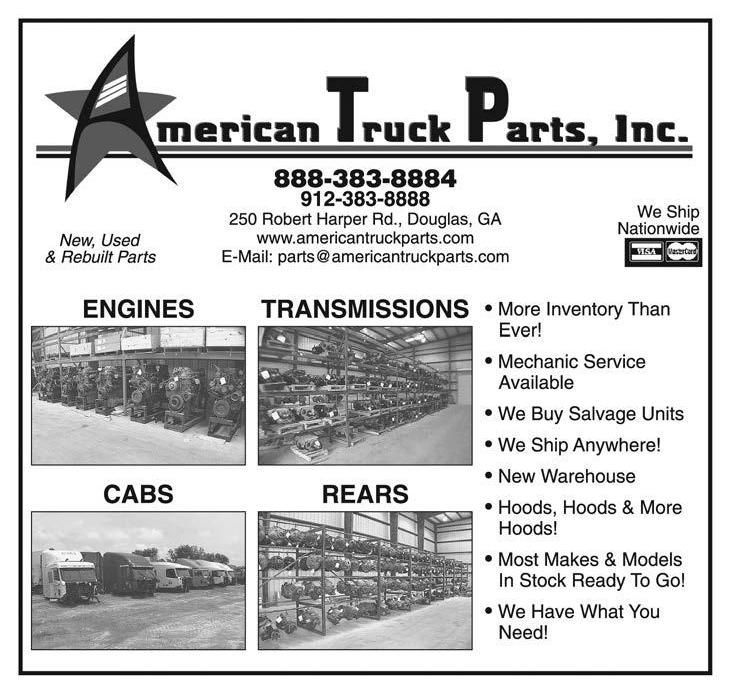
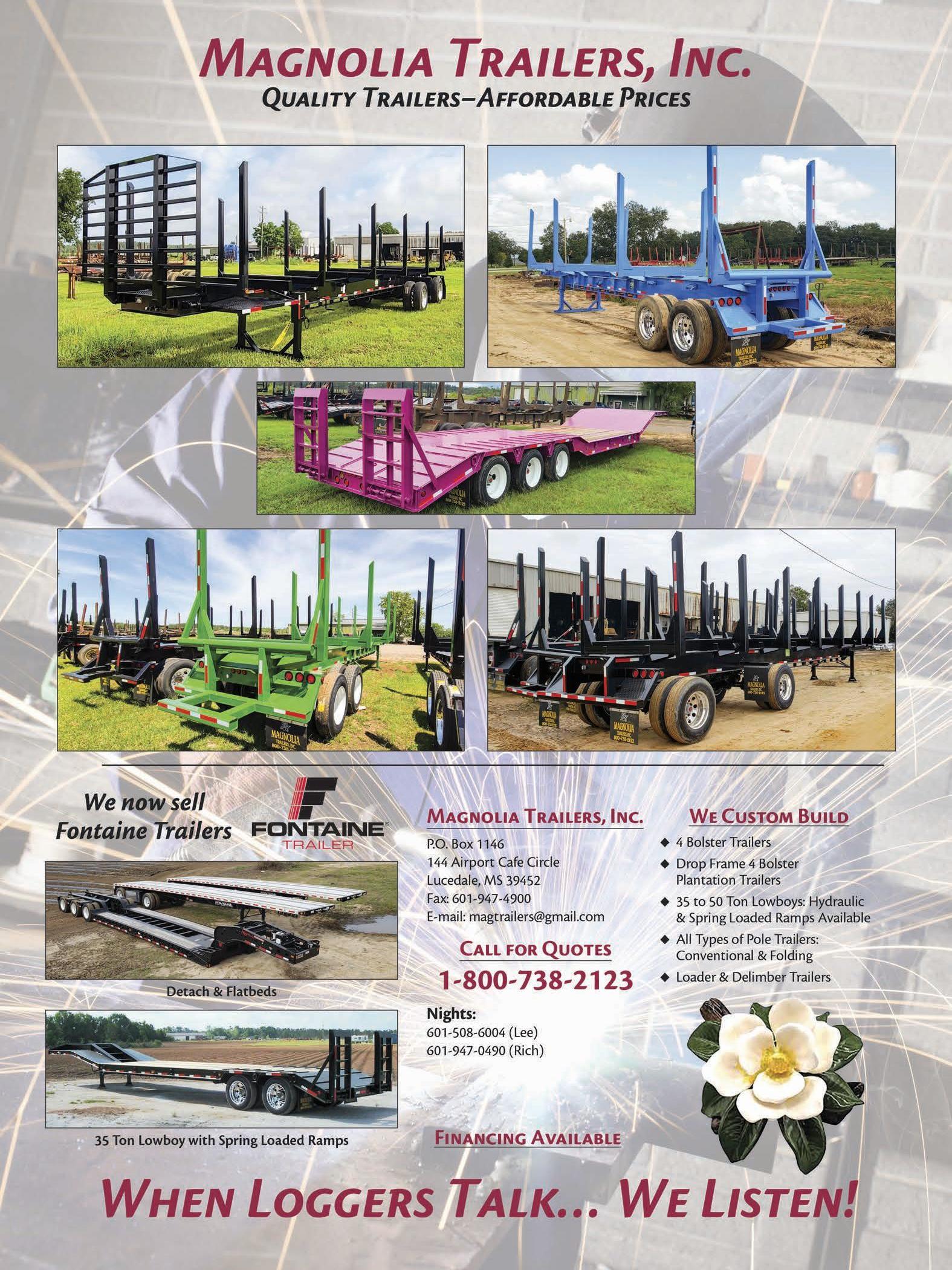
reasons, including the area’s workforce and natural resources.
GP Lumber President Fritz Mason comments, “With the mill favorably located in the middle of the southern pine forest of deep east Texas coupled with an experienced workforce that dates back to several generations, Pineland Lumber is well-positioned to prosper for years to come.”
The Pineland complex was part of a massive deal in 2016 when GP purchased the Temple-Inland Building Products operations from International Paper in 2016. IP had acquired Temple-Inland in 2012.
Temple-Inland built and operated lumber operations at Pineville for
West Fraser Purchases New SYP Sawmill
West Fraser Timber Co. Ltd. has entered into an agreement to ac quire the Angelina Forest Products southern yellow pine sawmill in Lufkin, Tex. for $300 million (U.S.). The new sawmill began construction in 2018, commenced operations in late 2019 and is expected to progress toward full production capacity of more than 300MMBF annually over the next three to four years.
West Fraser states the the acquisition is another important step in its continued expansion of its U.S. lumber operations.
Upon completion of the transaction, West Fraser will have combined Canadian and U.S. lumber production capacity of 7 billion BF, with U.S. capacity of SYP lumber representing 50% of the company’s capacity.
“With this acquisition we will be able to quickly capitalize on a fullyinvested and high-quality manufacturing facility,” comments West Fraser President and CEO Ray Ferris. “This includes a trained labor force and the local community and logistics infrastructure to support the mill’s supply chain, distribution and outlet for residuals. Further, we are able to immediately reap the cash flow benefits of our investment while significantly reducing the associated risks of greenfield construction, execution and startup.”
West Fraser intends to finance the acquisition with cash on hand. Annual synergies of $13 million are anticipated to be achieved within two years with minimal capital requirements. These synergies are expected to be realized through continued capacity utilization improvement, implementation of best practices and the coordinated transportation, logistics and procurement benefits derived from West Fraser’s distribution scale and existing production facilities in the region.
The ownership structure of AFP was composed of local businessmen and landowners.Bandit Announces More Expansion Plans
Bandit Industries plans to build three new production facilities and expand an existing plant in 2022. That’s in addition to four building expansions in 2021, one that is completed and three more that are under construction. When all are completed, Bandit’s manufacturing facilities will increase from 340,000 sq. ft. to 560,000 sq. ft. Bandit Industries has announced additional expansions of its manufacturing facilities in Remus, Mich. The demand for Bandit products and the backlog has skyrocketed to the point that Bandit needs to double its 2020 production, a record year for Bandit. Bandit employs 600, up from 450 in 2020. Bandit presently has 100 positions to fill and plans to add more employees in 2022 when the new facilities are completed.
Bandit will introduce three new products in 2022 that will add to the product demand.
Bandit is an employee-owned company. “It is exciting to watch the enthusiasm that employee ownership brings in driving the business upward” says Jerry Morey, President of Bandit. “They are all benefiting from their success.”
